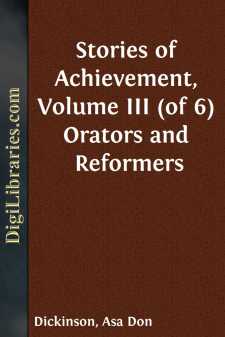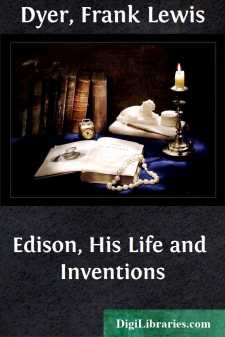Biography & Autobiography
- Adventurers & Explorers 15
- Artists, Architects, Photographers 16
- Business 2
- Composers & Musicians 14
- Criminals & Outlaws 5
- Editors, Journalists, Publishers 6
- Educators 1
- Entertainment & Performing Arts 3
- General
- Health, Exercise & Fitness 1
- Historians 3
- Historical 83
- Law Enforcement 1
- Lawyers & Judges 3
- Literary 147
- Medical 7
- Military 48
- Naturalists, Gardeners, Environmentalists 8
- Personal Memoirs & Diaries 227
- Philosophers 3
- Political 9
- Presidents & Heads of State 38
- Religious 38
- Rich & Famous 27
- Scientists 13
- Women 31
General Books
Sort by:
by:
Mary L. Day
INTRODUCTION. Mrs. Arms has asked me to write an introduction to her book. It hardly seems to need it. The title-page shows that it was written by one who is blind. It is a sequel to another volume. That volume has been widely sold, and all who read it will, I am sure, have some desire to see how the stream of the life of its writer has been flowing since her first book was written. Her patient...
more...
by:
DadaBhagwan
Na arena da espiritualidade, há pessoas espirituais únicas e notáveis que alcançaram os mais altos níveis de desenvolvimento espiritual. Alguns permanecem em reclusão, enquanto outros se tornam professores espirituais que apoiam a transformação espiritual da humanidade. Mas é extremamente raro encontrar um Gnani Purush (incorporação do conhecimento do Ser) e acessar seu poder espiritual para...
more...
by:
Samuel Smiles
CHAPTER I. IRON AND CIVILIZATION. "Iron is not only the soul of every other manufacture, but the main spring perhaps of civilized society."—FRANCIS HORNER. "Were the use of iron lost among us, we should in a few ages be unavoidably reduced to the wants and ignorance of the ancient savage Americans; so that he who first made known the use of that contemptible mineral may be truly styled...
more...
DEMOSTHENES THE ORATOR WHO STAMMERED Modern critics are fond of discriminating between talent and genius. The fire of genius, it seems, will flame resplendent even in spite of an unworthy possessor's neglect. But the man with talent which must be carefully cherished and increased if he would attain distinction by its help—that man is the true self-helper to whom our hearts go out in sympathy....
more...
by:
Frank Lewis Dyer
CHAPTER I THE AGE OF ELECTRICITY THE year 1847 marked a period of great territorial acquisition by the American people, with incalculable additions to their actual and potential wealth. By the rational compromise with England in the dispute over the Oregon region, President Polk had secured during 1846, for undisturbed settlement, three hundred thousand square miles of forest, fertile land, and...
more...
by:
Lyndon Orr
DEAN SWIFT AND THE TWO ESTHERS The story of Jonathan Swift and of the two women who gave their lives for love of him is familiar to every student of English literature. Swift himself, both in letters and in politics, stands out a conspicuous figure in the reigns of King William III and Queen Anne. By writing Gulliver's Travels he made himself immortal. The external facts of his singular relations...
more...
I — THE LIFE OF HUXLEY Of Huxley's life and of the forces which moulded his thought, the Autobiography gives some account; but many facts which are significant are slighted, and necessarily the later events of his life are omitted. To supplement the story as given by him is the purpose of this sketch. The facts for this account are gathered entirely from the Life and Letters of Thomas Henry...
more...
THE FAMILY OF JOHN CLEMENS A long time ago, back in the early years of another century, a family named Clemens moved from eastern Tennessee to eastern Missouri—from a small, unheard-of place called Pall Mall, on Wolf River, to an equally small and unknown place called Florida, on a tiny river named the Salt. That was a far journey, in those days, for railway trains in 1835 had not reached the South...
more...
by:
Alex Bein
Introduction Theodore Herzl was the first Jew who projected the Jewish question as an international problem. "The Jewish State," written fifty years ago, was the first public expression, in a modern language, by a modern Jew, of a dynamic conception of how the solution of the problem could be accelerated and the ancient Jewish hope, slumbering in Jewish memory for two thousand years, could be...
more...
THE BRAVE ACCUSER OF BENEDICT ARNOLD. John Brown, of Pittsfield, Mass., now almost forgotten, was a patriot in our Revolution of 1775 whose career has been described more than once by men in New York and in Berkshire County, but, as it is now time to give more impartial views of the controversy, perhaps another sketch of the life of this leader may encourage others to search for clearer views of the...
more...











